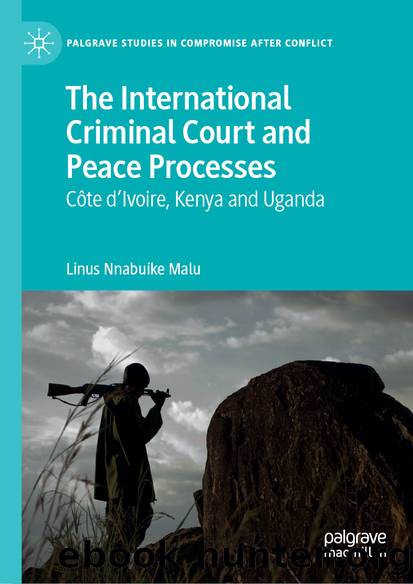The International Criminal Court and Peace Processes by Linus Nnabuike Malu

Author:Linus Nnabuike Malu
Language: eng
Format: epub
ISBN: 9783030199050
Publisher: Springer International Publishing
5.3.1 The International Criminal Court Involvement and Kenyaâs Response
Following the recommendation of CIPEV on prosecuting those who were allegedly responsible for the violence and the failure of Kenya to establish a Tribunal, a sealed envelope containing the names of the suspects was handed over to the chief prosecutor of the ICC by the lead mediator on 9 July 2009. The ICC chief prosecutor in November 2009 commenced preliminary examination of the situation in Kenya. On 31 March 2010, Pre-Trial Chamber II, upon the chief prosecutorâs application, pursuant to article 15 of the Rome Statute, authorised the commencement of an investigation into the situation. Pre-Trial Chamber II held, among other things, that cases from Kenya will be admissible before the Court because the country was not investigating or prosecuting those who allegedly bore the greatest responsibility for crimes committed during the PEV (Jalloh 2012). However, the suitability of the ICC to deal with the post-election violence has remained uncertain, since the issues involved are mostly political.
The ICC initially indicted six persons for being responsible for the crimes. This number was reduced to four as the indictments of two persons were not confirmed. The four indicted persons are William Samoei Ruto, Joshua Arap Sang, Uhuru Muigai Kenyatta and Francis Muthaura. The charges against Francis Muthaura and Uhuru Kenyatta were subsequently dropped because there was insufficient evidence to sustain them (Mueller 2014).2 Also, the charges against William Samoei Ruto and Joshua Arap Sang were, on the 5 April 2016, vacated by the Trial Chamber.3 In separate cases, warrants of arrest were also issued against Walter Osapiri Barasa, Paul Gicheru and Philip Kipkoech Bett (The Prosecutor v. Walter Osapiri Barasa,4 and The Prosecutor v. Paul Gicheru and Philip Kipkoech Bett5) for offences against the administration of justice, consisting of corruptly or attempting to corruptly influence the ICCâs witnesses.
Kenyaâs responses to the involvement of the ICC in prosecuting the violence have been a mixture of official cooperation, rejection of ICC involvement, campaigns/lobbying against the ICC (Wrong 2014), threats to withdraw from the ICC and legal defence (Jalloh 2012). These responses have resulted in practical actions, such as visits of top government officials to the ICC, mobilisation of African states through the AU against the ICC (Wrong 2014), lobbying at the United Nations Security Council to have the matters deferred, intimidating and lobbying witnesses, and challenging the admissibility of the cases from Kenya in the ICC. The election of Kenyatta and Ruto as President and Vice-President, respectively, became a turning point in the relationship between the government and the ICC. It became clear after the election of the duo that the government was not ready to cooperate with the ICC (Hoehn 2013).
Kenya cooperated with the ICC in 2008 and 2009 before the unsealing of the names of those suspected to bear the greatest responsibility for the PEV. The GoK responses changed after the OTP released the names of the six suspects in December 2010. Kenya began lobbying the African Union, African states and members of the
Download
This site does not store any files on its server. We only index and link to content provided by other sites. Please contact the content providers to delete copyright contents if any and email us, we'll remove relevant links or contents immediately.
The Borden Murders by Sarah Miller(4312)
The Secret Barrister by The Secret Barrister(3696)
Police Exams Prep 2018-2019 by Kaplan Test Prep(2540)
Coroner's Journal by Louis Cataldie(2476)
The Splendid and the Vile by Erik Larson(2458)
Terrorist Cop by Mordecai Dzikansky & ROBERT SLATER(2071)
A Colony in a Nation by Chris Hayes(1927)
My Dark Places by James Ellroy(1926)
The Art of Flight by unknow(1872)
Black Klansman by Ron Stallworth(1790)
Objection! by Nancy Grace(1778)
A Life of Crime by Harry Ognall(1728)
The New Jim Crow by Michelle Alexander(1701)
Anatomy of Injustice by Raymond Bonner(1664)
American Prison by Shane Bauer(1656)
Invisible Women by Caroline Criado Perez;(1639)
Whoever Fights Monsters by Robert K. Ressler(1616)
Obsession (The Volkov Mafia Series Book 1) by S.E Foster(1575)
A is for Arsenic: The Poisons of Agatha Christie (Bloomsbury Sigma) by Kathryn Harkup(1538)
